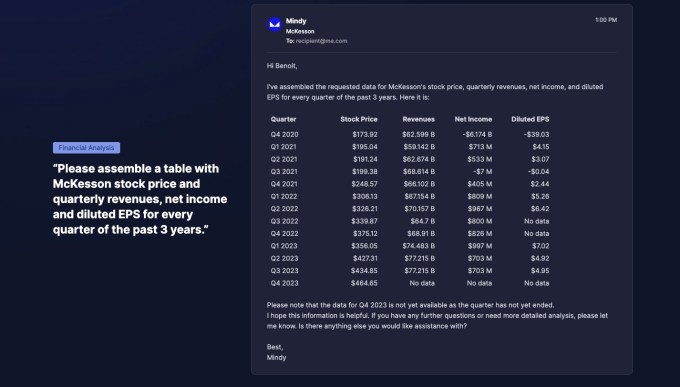
Agent-based AI approaches, such as AutoGPT, were popular last year. This year, we are witnessing startups applying some of these use cases of “let the AI do the work for you.” Mindy, which claims to be your email-based executive assistant, is one of them.
Mindy is easy to use. You can email the assistant at m@mindy.com with a question like “I want to know about all the events happening in my area [you have to specify the area] this weekend with links to book tickets.” or “Can you get me revenue figures of Apple in a table for last eight quarters?”
Mindy searches for that information on the web and replies with an email after some time.
Currently, Mindy is free to use as the company is figuring out the right price point for the service.

Mindy was founded by Yu Pan, Cuong Do, and Benoit Berthoux last year. Pan was an early engineer at both PayPal and YouTube. Do joined PayPal in 2002 and was also an early engineer at YouTube. Berthoux has worked at consulting firms such as Capgemini and Accenture.
The company has secured $6 million in a seed round led by Sequoia Capital (with Roelof Botha as the lead partner) and Founders Fund.
“The idea was born in 2022, when I was wrapping up my work in the Crypto side of things and Benoit was finishing his project. AI was emerging with the popularity of models like GPT-3.5. It needed a lot of prompt engineering to make these models work. So we thought as these models are supposed to understand the language, tools shouldn’t make you think a lot before using,” Pan told TechCrunch about launching the company.
Berthoux said when Mindy did market research, it discovered that people use apps like ChatGPT but lose interest. Interestingly, ChatGPT still has over 100 million active users despite this.
The company began testing Mindy in a “semi-stealth” mode in November. But it didn’t reveal how many users are using Mindy.
Choosing email as a distinctive feature Pan said the company decided to build on email as it has a better signal-to-noise ratio for information, and it’s also more topic-oriented.
“Email is text-based and our LLMs are text-based. So we thought it was a perfect match. The way we viewed these mediums is like we’re trying to combine in essence, the oldest tech in the book with the newest tech,” he said.
The startup says many of its users — from financial analysts to students and defense contractors — use the bot to do research. And since the AI assistant is on email instead of a web interface, they don’t need the reply right away.
The company believes that as email and the conversational tone of the medium are known to people, they don’t have to alter their workflow to fit the product in their lives. Plus, you can use use with a group of other people while brainstorming or planning.
The company said due to the asynchronous nature of the email, the agent can have more freedom or automation to get you relevant results.
While email is the main focus for the company, it has tried other distribution channels as well for different use cases.
The company has a team of 10 people right now and wants to hire people to speed up growth with engineering courses. It is also looking at different ways of monetization including subscriptions, query limit, or taking a cut from completed purchases. However, it hasn’t settled on a specific method.
The agent-based approach As my colleague Devin Coldewey wrote in his year-end article, we are seeing more AI-focused startups embracing an agent-based approach. The Browser Company, which makes the Arc Browser, recently revealed that it is working on an AI agent that surfs the web for you.
An industry executive, who asked to remain anonymous, said startups like Mindy who are attempting to create an agent will have to build enough distinction not to be eclipsed by the likes of ChatGPT. They said these tools will have to deliver really high value to customers and find a way to attract users affordably.
Hemant Mohapatra, Partner, Lightspeed thinks AI-assistant-based startups need to prioritize user delight and reliability.
“Exceptional consumer apps often see rapid growth in their early stages, driven by strong consumer satisfaction and word-of-mouth recommendations,” he said. Mohapatra pointed out that for assistants to manage end-to-end requests, they will need more users’ data, and that means they have to focus more on compliance and security.